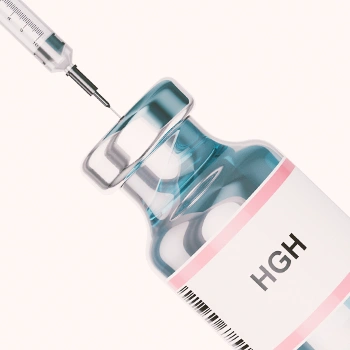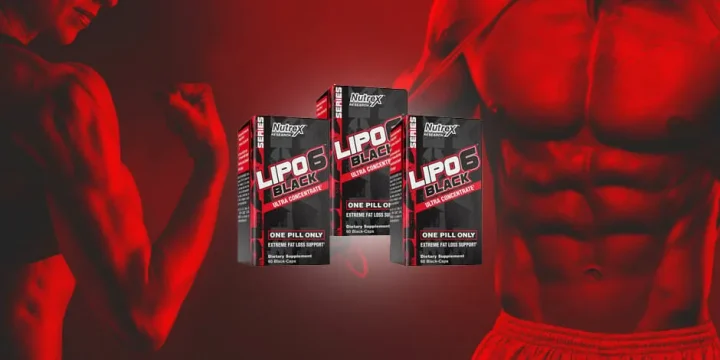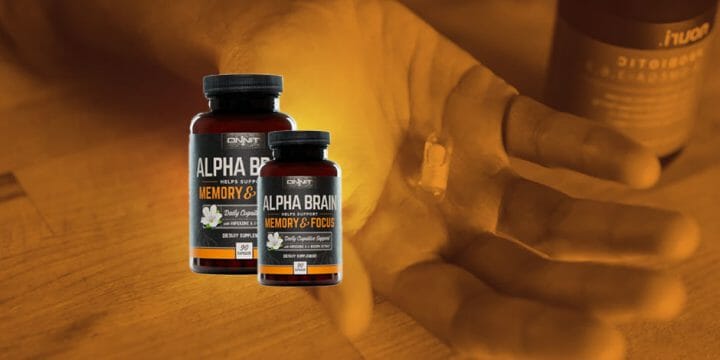Human growth hormone (HGH) is a naturally occurring peptide hormone, and it plays a key role in regulating cell growth in humans.
The largest natural fluctuations happen in childhood, where HGH helps with muscle and bone growth, as well as the growth of all other organs of the body.
And it’s that growth effect that creates a huge temptation for athletes to resort to HGH treatment drugs to boost their strength and muscle development.
The problem is that medical treatments come with significant side effects, so I got together with an experienced endocrinologist to research what it does to the body and why it’s a risky choice for athletes.
Quick Summary
- Human Growth Hormone (HGH) is a peptide hormone that repairs, maintains, and builds body cells in organs, muscles, and bones, and is crucial for human growth and development.
- HGH misuse can lead to side effects like joint pain, muscle pain, fluid retention, and increased LDL cholesterol levels.
- HGH is banned for professional athletes due to its performance-enhancing effects and difficulty in detection in standard drug tests, according to the British Journal of Sports Medicine.
- In my opinion, the risks associated with HGH misuse, especially in sports, outweigh its potential benefits in enhancing physical performance.
What Does Human Growth Hormone Do?

HGH is essential for body growth and development, aiding in cell repair and regeneration. Its levels are influenced by factors like short bowel syndrome, and overproduction may lead to insulin resistance. Available only by prescription, HGH is crucial for maintaining healthy bones, muscles, and organs.
In addition to its well-known benefits, HGH plays a crucial role in musculoskeletal health, significantly impacting muscle growth and bone density, which is particularly beneficial for athletes, older adults, and adolescents seeking to enhance their physical performance and overall health.
In my MMA training, I've seen how crucial HGH is for muscle growth and bone density, enhancing physical performance crucial in the ring.
Beyond its role in growth and metabolism, HGH also exerts a profound influence on cardiovascular health, affecting heart function, blood pressure regulation, and cholesterol levels, thereby offering a multifaceted approach to overall wellness.
While the levels naturally fluctuate with age, HGH treatments are predominantly used to deal with certain medical conditions that have impacted bone and muscle wasting [1].
There are also other diseases that can directly influence HGH and sex hormones, e.g., a pituitary tumor, according to the Mayo Clinic [2].
While HGH treatments are only designed and approved for use in such diseases, many athletes resort to injecting HGH to improve athletic performance and body composition.
How Is HGH Linked To The Pituitary Gland?
HGH, produced by the pituitary gland, plays a key role in body growth and development, potentially increasing muscle mass and reducing fat. However, it can cause side effects like joint and muscle pain. The pituitary gland regulates HGH release, and some people use dietary supplements to support its levels [3].
Patients with an HGH deficiency can either be experiencing issues with this gland itself, or there might be an issue with the supply of growth hormone-releasing hormone (GHRH) [4].
GHRH essentially sends the signal to increase or decrease the release of HGH and acts as a regulator.
It’s important to understand that HGH and another hormone-insulin-like growth factor (IGF-1) are closely tied as the second manages the effects of the first, so they have a direct impact on cell growth and metabolism, according to the Frontiers [5].
Signs Of Growth Hormone Deficiency

The most common type of HGH deficiency is called idiopathic HGH deficiency, and it predominantly affects children, according to Johns Hopkins Medicine [6].
Typical symptoms are slow growth and a height that is in the lowest 5th percentile.
It can also delay puberty and cause long-term issues in adulthood.
In order to treat poor growth in children, physicians often use synthetic HGH to increase muscle mass and bone development to a more normal level.
In adults, such a deficiency is a lot more difficult to diagnose, but it can often include early-onset osteoporosis [7].
As an MMA fighter, I'm vigilant about HGH deficiency signs like early-onset osteoporosis, which could be a game-changer in my career.
HGH Misuse Side Effects

Taking HGH comes with an increased risk of several different side effects that can range in severity depending on the dose and how long people end up taking such drugs.
From my experience in the fighting community, I've seen how HGH misuse can lead to severe side effects, a risk not worth taking.
Doctors carefully monitor these side effects:
- Muscle Pain
- Joint Pain
- Fluid retention
- Carpal tunnel syndrome
- Tingling and numb skin
- High LDL cholesterol
- Heart Disease
Is HGH Banned For Athletes?

HGH is prohibited for professional athletes because it's considered a performance-enhancing drug.
Synthetic HGH injections accelerate muscle repair and growth, offering an unfair advantage in athletic performance.
They also reduce body fat, making them attractive to bodybuilders, according to the British Journal of Sports Medicine [8].
Athletes have been favoring HGH as it’s a lot more difficult to detect in standard drug tests. In the MMA world, the challenge of detecting HGH in drug tests is well-known, but the risks of using it outweigh the potential benefits.
And in many cases, tests can only pick it up within 48 hours of taking it [9].
“Lab-produced growth hormone looks almost exactly like the stuff we make in our bodies. It has the same sequence of amino acids, and it stays in the bloodstream for the same amount of time. It’s much easier to suss out a steroid user; synthetic steroids don’t have the same structure as their natural kin.”
- Daniel Engber, Columnist at Slate.com
FAQs
Is Hgh a Steroid?
No, HGH is not a steroid, even though people often bundle growth hormones and steroids into one category. HGH is a protein hormone that doesn’t have the same androgenic effects as steroids and testosterone.
Will Hgh Make Me Gain Weight?
Yes, HGH will make you gain weight. And without a strict exercise routine, that gain can predominantly be in the form of fat rather than muscle.
Avoiding The Temptation Of HGH Use
Unless you’ve been medically diagnosed with a growth hormone deficiency, there is no legitimate reason to take HGH.
Human growth hormone (HGH) plays a crucial role in promoting growth and maintaining bone density, especially during childhood and adolescence. As individuals reach middle age, HGH levels naturally decline, leading to potential age-related changes. HGH treatment may be considered to address specific medical conditions and promote growth, but it should be carefully monitored due to potential side effects. The availability of HGH is regulated and requires a prescription for medical use.
There are significant risks involved, and there is increasing interest in sports organizations to introduce more stringent testing.
The safer alternative is to take natural HGH boosting supplements. These contain researched vitamins, minerals, and herbs that directly influence your body’s HGH release without adding illegal and banned substances.
While the results don’t come within a few days, you can still achieve considerable muscle gains in the medium to long-term.
It’s the best option if you need a boost to get to your fitness goals faster.
References:
- https://www.webmd.com/fitness-exercise/human-growth-hormone-hgh
- https://www.mayoclinic.org/diseases-conditions/pituitary-tumors/symptoms-causes/syc-20350548
- https://www.yourhormones.info/hormones/growth-hormone
- https://www.britannica.com/science/growth-hormone-releasing-hormone
- https://www.frontiersin.org/journals/endocrinology/articles/10.3389/fendo.2019.00777/full
- https://www.hopkinsmedicine.org/health/conditions-and-diseases/growth-hormone-deficiency
- https://www.cedars-sinai.org/health-library/diseases-and-conditions/a/adult-growth-hormone-deficiency.html
- https://www.ncbi.nlm.nih.gov/pmc/articles/PMC2657499
- https://eu.usatoday.com/story/sports/nfl/2014/11/06/questions-and-answers-about-the-nfls-test-for-hgh/18605279/
About The Author
You May Also Like






